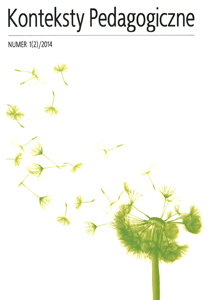Abstract
The following article focuses on “metalogical” characteristics of a child’s play and activity, starting from Bateson’s studies. This particular point of view enables us to consider, in an original way, the question on “how children communicate and think”. The aim of the work is to emphasize the scientific, heuristic and experimental value of children’s cognitive and emotive processes, because of their ecological competencies, which they manifest in every experience that they gain.
References
AA. VV., Gregory Bateson: rigore e immaginazione, “Rivista di psicoterapia relazionale”, 8, FrancoAngeli, Milano 1998.
Annacontini G., Pedagogia e complessità, Pisa 2008.
Bateson G., Mente e natura, Milano 1984.
Bateson G., Una sacra unità, Milano 1997.
Bateson G., Verso un’ecologia della mente, Milano 2010.
Bateson G., Bateson M.C., Dove gli angeli esitano, Milano 1989.
Benveniste E., Problemi di linguistica generale, Milano 2010.
Bertrando P., Bianciardi M. (a cura di), La natura sistemica dell’uomo. Attualità del pensiero di Gregory Bateson, Milano 2009.
Borges J.L., Storia universale dell’infamia, Milano 1961.
Conserva R., La stupidità non è necessaria. Gregory Bateson, la natura e l’educazione, Scandicci 1996.
Cotugno A., Di Cesare G. (a cura di), Territorio Bateson, Roma 2001.
De Biasi R., Gregory Bateson. Antropologia, comunicazione, ecologia, Milano 2007.
Deriu M. (a cura di), Gregory Bateson, Milano 2000.
Dewey J., Come pensiamo, Firenze 1961.
Fried E., Vecchiaia in: È quel che è, Torino 1988.
Gentile M.T., Immagine e parola nella formazione dell’uomo, Roma 1965.
Held J., L’immagianrio al potere, Roma 1978.
Manghi S., La conoscenza ecologica, Milano 2004.
Manghi S. (a cura di), Attraverso Bateson, Milano 1994.
Montessori M., Educazione per un mondo nuovo, Milano 1991.
Mottana P., Piccolo manuale di controeducazione, Milano 2011.
Semeraro A., Pedagogia e comunicazione, Roma 2007.
Zoletto D., Il doppio legame Bateson Derrida, Milano 2003.
In accordance with the recommendation of the Ministry of Science and Higher Education, which aims to counteract the practice of “ghostwriting” and “guest authorship,” all authors submitting their text for publication should attach an author’s statement which declares the contribution of each of the authors to the article. The printed and signed statement should be delivered by mail or other means to editor-in-chief Joanna Skibska or sent in the form of a scan to the following e-mail address: redakcja@kontekstypedagogczne.pl. The authors will not receive remuneration for publishing their papers. The editors reserve the right to make minor editorial changes to the articles which will not affect the substance of the article. We encourage all authors to prepare their articles in accordance with the guidelines for manuscript preparation. Download pdf file.
Authors transfer all copyrights and grant the journal the right of first publication with the work simultaneously licensed under a Creative Commons Attribution License that allows others to share the work with acknowledgement of the work's authorship and initial publication in this journal. All authors agree to the publishing of their email addresses, affiliations and short bio statements with their articles during the submission process.

